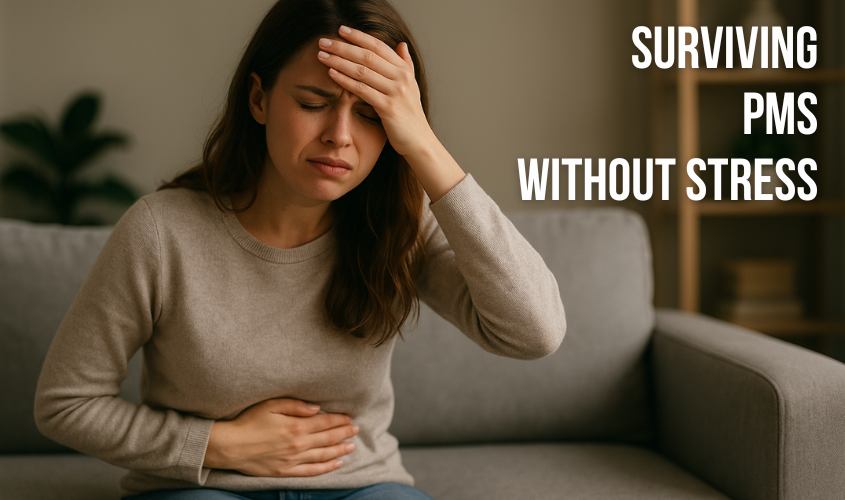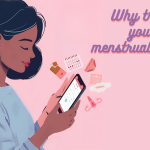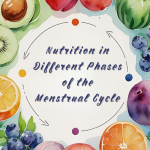
- 25.08.2025
- Menstrual Health Blog
Have you ever noticed how just a few days before your period the world seems to turn upside down? Yesterday your favorite jeans fit just fine, and today they barely button up. Your mood swings, your appetite craves sweet or salty snacks, and that inner voice whispers: “How much longer do I have to endure this?” The comforting part is: you are not alone. Premenstrual Syndrome (PMS) affects almost every woman from time to time. For some, it passes almost unnoticed; for others, it becomes a real challenge: breast tenderness, heavy legs, irritability, and sometimes tears for no apparent reason.
So how can we reduce the discomfort? Let’s figure it out with a simple example.
Why PMS Happens
After ovulation, the body switches its hormonal mode: progesterone rises, estrogen drops. These fluctuations affect not only the uterus but also our mood and energy levels. Add in lack of sleep, stress, and chaotic eating, and the picture of PMS becomes clearer: lower back pain, headaches, unexplained fatigue, and the desire to “fix it all” with a bar of chocolate.
PMS Symptoms That Are Hard to Miss
Mood swings: from “touch me and I’ll explode” to “hug me right now”
Lingering drowsiness and a sense of emptiness
Mild pain in the lower abdomen or back
Facial swelling and a heavy feeling in the body
Breast tenderness
Cravings for specific tastes — most often sweet or salty
If you’re experiencing several of these symptoms at once — it’s normal, that’s just how your body reacts.
What Really Helps with PMS
Adjusting Your Diet
Our well-being is directly connected to what’s on our plate. Try reducing sweets and coffee in the premenstrual days: this helps avoid sudden mood swings. Salt retains fluid, so it’s better to cut down on it too. On the other hand, greens, legumes, nuts, and whole grains are rich in magnesium and B vitamins, which support the nervous system. Cold-water fish and flaxseed oil provide omega-3s that reduce inflammation, while dairy products and fatty fish are valuable sources of calcium and vitamin D.
Giving the Body Some Activity
When your soul is begging for a blanket, give your body light movement instead. A few yoga asanas or stretches, a slow walk in the park, swimming, or biking get your blood flowing, oxygenate the brain, and trigger the release of endorphins — nature’s antidepressants.
Sleep Is Everything
It’s easier to cope with PMS if you have enough energy reserves. Try going to bed at least half an hour earlier. Put your phone away an hour before sleep, air out the room — small steps like these help you rest deeper and calmer.
Finding Time for Yourself
Deep breathing, slow music, aromatic tea — any small rituals help calm the mind. Sometimes even ten minutes alone by the window can restore balance.
Herbs and Warm Drinks
Chamomile and lemon balm relieve tension, ginger warms the body and reduces cramps, and mint eases bloating. Just remember that even herbal remedies may have contraindications — it’s best to consult a doctor.
Don’t Stay Silent
PMS is not a whim. Sometimes it helps to warn loved ones: “I’m a bit more sensitive right now because my period is coming.” Honest conversation relieves tension and helps avoid misunderstandings.
When to See a Specialist?
If symptoms are so severe that you can’t work, study, or communicate, it’s worth consulting a doctor. Doctors recognize Premenstrual Dysphoric Disorder (PMDD) — a condition similar to PMS but accompanied by serious depressive symptoms. In such cases, it’s better not to delay seeking professional help.
A Few Words from Experts about PMS
Gynecologist Elena Vasilyeva reminds us: keeping a cycle diary helps identify which lifestyle changes improve your well-being. She often recommends adding magnesium to the diet and cutting down on coffee and sugar.
Stylist Anna Kovaleva believes small things can cheer you up. Go for a manicure, treat your hair with a mask, meet friends over a cup of tea — all this helps to take your mind off unpleasant feelings.
Why Try the Selin App?
For those who want to understand their bodies better, the Selin app can be very useful. It allows you to track your state, diet, sleep, receive daily recommendations, and notice repeating patterns. Knowing that a difficult period is approaching makes it easier to prepare and stay patient.
You can’t cancel PMS, but you can soften its impact. Self-care, mindful eating and routines, physical activity, and support from those around you help make these days more comfortable. The main thing to remember is: you deserve care and understanding, and it’s absolutely okay to ask for help.














